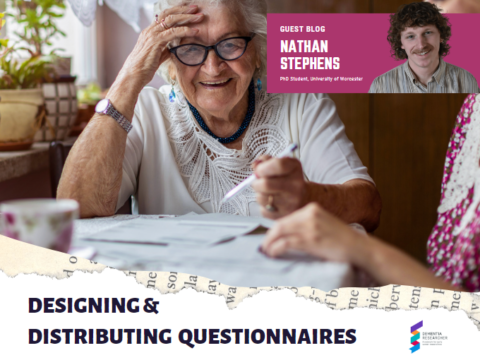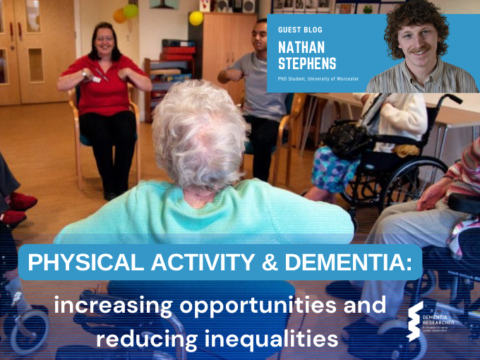
Nathan Stephens
Name:
Nathan Stephens
Job title:
PhD Student and unpaid carer
Place of work / study:
Area of Research:
Working on the Worcestershire Meeting Centres Community Support Programme , exploring a novel countywide approach to scaling up the provision of a psychosocial intervention for people affected by dementia. It is hoped the project will improve the lives of people affected by dementia across the county and provoke further dissemination of the Meeting Centres model nationwide.
How is your work funded?
PhD studentship is match funded by the Shaw Foundation.
Tell us a little about yourself:
Born and bred in Wrexham, a border town in North Wales not too far from Merseyside. Some call me the ‘Welsh scouser’ or ‘la’ – if your familiar with Liverpudlian slang you will understand the latter – but most just call me Nathan.
I have been lucky enough to complete a BSc Sport and Physical Education at Cardiff Metropolitan and MSc Public Health at Liverpool John Moores. Professionally, I have occupied a number of Health and Social Care roles including dementia care, mental health services, GP referral programmes, and child protection.
All that formal stuff a side, a snapshot of me, the real me, would be sat in a ‘proper’ pub (the ones with duke boxes and free roaming dogs) with a pint in one hand, nuts in the other, and challenging the dogmatic doctrines of society with a friend or foe.
Tell us a fun fact about yourself:
In my time on earth, I have met an Angel (Justin) and a Witch (Tracey)
Why did you choose to work in dementia?
In my late teens my grandfather was diagnosed with dementia, which is when I first became aware of the condition. I was quickly shocked at the lack of provision in place to meet his needs and wanted to start providing exercise programmes for people living with dementia in residential settings. Suffice to say my entrepreneurial aspirations never materialised, but it thrusted me into academia, in where (hopefully) I have found a place of purpose. I was hooked on the progressive nature of research to challenge the status quo and drive social change. Unfortunately, my grandfather passed away several years ago and my grandmother has since been diagnosed with dementia. Along with my father, we care for my grandmother so that she can remain in her home. In many ways I didn’t chose to work in the field.
People affected by dementia experience systemic injustice. This is what motivates me to work in dementia: the knowledge that like my family and I, people are experiencing prevalent but preventable injustices on a catastrophic level and I can make a positive difference.
Do you have any advice for someone looking to embark on a career in dementia research?
Get some experience/volunteer. Lots of research departments have the capacity and it will (1) boost your chances of success; and (2) give you a taster of what academic life is like.
Do your research. Dementia research is a vast, vast, vast field. Make sure you focus in an area you are passionate about and feel will still get you fired up later down the line.
What are the best bits about being an ECR?
Learning and cultural vibrancy. Academia is the only setting I have worked where I learn something valuable every day! This was a key motivation for doing a PhD, so I am glad it came to fruits. Also, it is just a cool place to work. Its vibrant with culture. There are weekly webinars, events, conferences, research forums, the list goes on…
Might not be generalisable this one, but the team in my research department are incredibly nice. When doing my BSc and MSc I felt that academics seemed happy souls, and so far, that hypothesis has not been nullified.
Freedom. If you’re like me, someone who hates workplace hyierachy and being a slave to the clock, then a PhD is great. Of course, a hierarchy exists but PhD students sit in an odd place between student and staff, and so far, workplace politics have yet to enter my realm. Additionally, unless you have a meeting you can pretty much work when you like. No counting down the minutes at the end of a shift.
What do you see as the main challenges?
Progress is glacial. Some days I spend 6+ hours staring at a screen in which nothing is processable. Other days I may write a good paragraph. And on a very small number of days I will have a breakthrough, but these transient episodes tend to come away from the desk. It’s a slow process and I am only just learning that after 6-months.
Not getting caught in the net. For me, doing a PhD brought along presumptions of what I needed to do, how I needed to act, and who I needed to become, which included changes that morally I wasn’t ok with. “I need to read most evenings, own a smart phone to have constant access to emails and network hard on social media”. This isn’t true. A wise lady tells me (quite often), “you do you”.
What do you write about?
What can you expect from my blogging? Well, I expect you will get a blend of my experiences doing research as I transition through my 1st year as a full-time PhD student, perhaps some content on my lived experience as a formal and informal dementia carer, as well as some ‘off the cuff’ stuff, that, be warned, may get a little political.

 Print This Post
Print This Post








